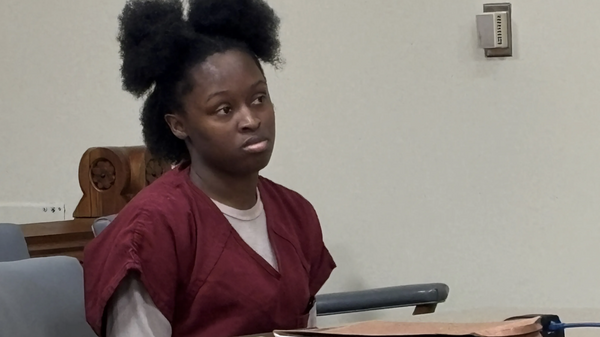When Andrea Siqueira moved to Australia from Brazil in 2016, she didn't know anyone, but made the move as she wanted to study at university here.
"When I moved here, I was by myself, so yeah, I felt a bit isolated … I moved here to study and to live, and to enjoy Tasmania," she said.
She connected with other international students through the Guess My Accent social and language exchange group based in Hobart.
"It helped a lot … I knew I would be OK making friends, but the group did help a lot," she said.
"To be introduced into the community and know more Australians and international students that were living here in Hobart, it was good."
Since the group started, she said the number of regulars had grown substantially.
"During COVID we couldn't meet but we were always talking to each other and supporting each other — we've had a lot of good events, we really enjoy it," she said.
Living alone not always a choice
According to the 2021 census, close to a third of Tasmanians (29 per cent) live alone, which is higher than the national average of one-in-four living solo (25.6 per cent).
The Australian Institute of Family Studies said rates of lone-person households have increased sharply since the 1970s.
"People may live alone because they can both afford to and choose to," the report from 2015 said.
"For others, living alone may not be their desired arrangement — they may live alone because of difficulties finding a partner, because of a relationship breakdown, or following the death of a partner."
A 2021 survey conducted by the Council on the Ageing showed in terms of social isolation and loneliness, 21 per cent of those asked said they had felt lonely in the last week and 3 per cent had said they had had no contact with anyone the week before.
A recent national study by Relationships Australia published in November showed almost 24 per cent of those asked felt lonely — up from 17 per cent in 2018.
It also found 45 per cent of people aged 18 to 24 years felt emotionally lonely, which is measured on having a significant attachment with somebody.
Mia Wang is also a member of the Guess My Accent social and language exchange group and moved to Tasmania in 2015.
"I initially moved to Melbourne for study, but now I'm here for work," she said.
"Making friends was hard initially I think mostly because my English wasn't as good and it's hard to break into social bubbles and groups," she said.
She said introductions from her housemates were crucial for her in meeting new people.
On how to best make new friends as a new Tasmanian, Andrea said her top trick is to be "out there".
"You need to talk to people, you need to go places you haven't been, you need to go out of your comfort zone," she said.
"It's hard when you stay home and just watch TV, for example, or you go to work.
"I think you need to go out there and talk to people and of course, baby steps, but you are going to meet new people."
For Mia, her advice is being brave and moving past the "fear" of not fitting in or being rejected.
Lack of social groups spurred action
Single mother Ruth Penhallow moved with her daughter to Launceston from Melbourne five years ago after a relationship breakdown.
"I couldn't afford Melbourne anymore so we moved in here with my mum," she said.
She knew quite soon after moving that she needed to reach out and make new friends.
"I realised online there was nowhere for people to meet and when people come to Tassie for the first time, they've got no friends, so I started this group on website Meet Up to make friends and to bring people together," she said.
"It's been going really, really well; we do so many things — we do dinners, we go out for lunches, we go to wineries, and sometimes we just have a coffee and a chat."
"It's just about bringing people together."
She said she feels loneliness is a growing issue for Launceston.
"It's a huge issue, like for me I don't have a big family, I've only got my mum here so it can be a very lonely time with Christmas and the holidays and without work to go to, you're trying to find things for your child to do too."
"It can be very lonely."
Number of people living alone on the rise
According to the 2021 census, close to a third of Tasmanians (29 per cent) live alone, which is higher than the national average of one-in-four living solo (25.6 per cent).
The Australian Institute of Family Studies said rates of lone-person households have increased sharply since the 1970s.
"People may live alone because they can both afford to and choose to. For others, living alone may not be their desired arrangement — they may live alone because of difficulties finding a partner, because of a relationship breakdown, or following the death of a partner," the report from 2015 said.
A 2021 survey conducted by the Council on the Ageing showed in terms of social isolation and loneliness, 21 per cent of those asked said they had felt lonely in the last week and 3 per cent had said they had had no contact with anyone the week before.
A recent national study by Relationships Australia published in November showed almost 24 per cent of those asked felt lonely — up from 17 per cent in 2018.
It also found 45 per cent of people aged 18 to 24 years felt emotionally lonely, which is measured on having a significant attachment with somebody.
"We've seen there has been a significant increase in loneliness since 2018 of around 5 or 6 per cent, so we know loneliness is on the increase," said Bec Hayes, a senior mental health worker for Relationships Australia Tasmania.
"Overall one in five said they felt lonely … so we know this time of year can be quite triggering, especially if you're away from friends and family. It can be very tough."
She encourages anyone struggling over the festive season to reach out.
"Get to know your neighbours, get involved in the community, reach out to friends and family too," she said.
"There's no shame in reaching out and there's a range of support services available — Beyond Blue, Lifeline — just call and have a chat because it does help people feel less isolated."







